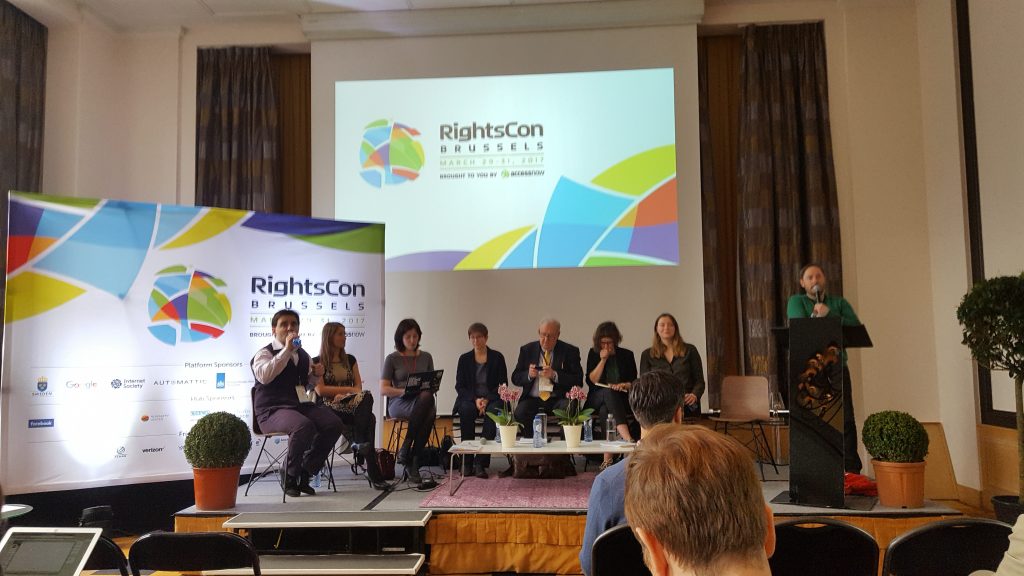Help us protect the commons. Make a tax deductible gift to fund our work. Donate today!

RightsCon is an annual conference that focuses on awareness-raising, organising, and advocacy on global issues at the intersection of technology and human rights. The event is produced by the international nonprofit organization AccessNow. RightsCon participants include members of digital rights organisations, legal experts, civil society, government, and business representatives.
Creative Commons, Mozilla, and the Wikimedia Foundation organized a panel discussion on the work being done to reform the European Union copyright rules. The goal of the session was to share information on key topics in the Commission’s proposal related to copyright and digital rights as well as connect people with educational and advocacy efforts that support a progressive reform in the public interest.
MEP Julia Reda set the stage for the panel, providing background about both the underlying principles for modernising the copyright rules, and also the process that’s involved and where we are now. Ms. Reda is a member of the European Pirate Party and VP for the Greens/European Free Alliance group, She was the rapporteur for the comprehensive copyright evaluation report presented to the Parliament in 2015.

Photo by Anna Mazgal, CC BY 4.0
We then moved on to explore six key issues of the copyright reform proposal. Lisette Kalshoven from Kennisland and the Communia Association explored the opportunities and challenges presented by the new copyright exception for education. Lisette talked about how the existing copyright exception for educational uses laid out in the 2001 Information Society Directive is quite good, but is not harmonized across all Member States and doesn’t cover online uses of educational content. The new education exception introduced in the Commission’s proposal is positive because it is mandatory. However, there are three main challenges. First, there is a feature whereby if there is a licensing option in a particular Member State, then that country could ignore the implementation of the education exception. Second, the exception would only cover more traditional educational establishments, such as schools, leaving out other informal education practices, such as online courses. Finally, there’s still some confusion about whether the new exception would adequately cover both online and offline uses of educational resources. Lisette also mentioned the recently-launched digital campaign https://rightcopyright.eu/, which aims to mobilize the public in supporting positive changes to copyright that will improve access and use of educational materials and technologies for teachers and students of all types.
Raegan MacDonald from Mozilla discussed the possibility for including a copyright exception for user-generated content. Raegan talked about how the idea of introducing this type of copyright exception would go a long way in creating a better balance in the reform, since the current provisions seem to address the (sometimes unwarranted) concerns of the traditional rights holders like publishers rather than new creators and users. While it was not included in the Commission’s original proposal for a Directive on Copyright in the Digital Single Market, an exception for user-generated content (UGC) has been introduced in the draft opinions of both the Culture and Education Committee and the Committee on the Internal Market and Consumer Protection. The key point on introducing a UGC exception is to support new digital creativity, free speech, and cultural expression.
Paul Ayris from University College London Library talked about the proposed exception to enable text and data mining. Paul said that current research predicts a 1.9% growth of European GDP if the EU commits to a broad exception for text and data mining. Researchers (or anyone else) should not be forced to acquire additional licenses to conduct text and data mining on content which they already have lawful access, and he argued that the EU should follow the lead of the recommendation laid down in the Hague Declaration that “the right to read is the right to mine.” The exception should also cover users and uses outside of the traditional academic research community, as doing so would promote novel innovation across and between the public and private sectors.
Marta Peirano from eldiario.es talked about the controversial ancillary right for press publishers. Marta explained the negative repercussion to news producers of Spain when they implemented an ancillary copyright a few years ago. This is because Google News, which would have been forced to pay fees to link to and provide context to publishers’ content, called the bluff of rightsholders by discontinuing their service. When users weren’t able to discover information through content aggregation services, access to news sites dropped precipitously. She explained that the publishers pushed for a similar ancillary right in Germany, with comparable results. With so much harm to readers and no return to rights holders, the only sane option is to remove the Commission’s ancillary right for press publishers through Parliament amendments.
Agata Nowacka from Seznam talked about the Commission’s proposal that would require filtering of user-uploaded content. Seznam is a search engine based in the Czech Republic that enjoys a high market penetration there—it is one of the few places in Europe where Google does not fully dominate the search market. Agata said that as a relatively small operation (~1000 employees) Seznam would be hard pressed to pull the resources required to implement an active monitoring mechanism proposed by the Commission’s draft directive. This type of “active censorship” would be negative for most of their users, and might only work to reinforce the ubiquity of the major players, thus reducing competition in the search business.
Finally, Dimi Dimitrov from Wikimedia’s Free Knowledge Advocacy Group EU discussed policy options for safeguarding the public domain. While there are some positive provisions in the Commission’s proposal to strengthen cultural heritage institutions, there are several ongoing disputes between museums and the Wikipedia community. Dimi pointed to a case in which a German museum claimed copyright on the digital reproduction of a portrait of composer Richard Wagner. The work was painted in 1862, so it clearly is in the public domain, which would make it a natural addition to the Wikipedia page about Wagner. However, the museum claims a new copyright that arises when the work was digitized, thus for all practical purposes keeping the work out of the public domain. Dimi said that these types of disputes are not uncommon, and that a forward-looking EU copyright law should aim to clarify that digital reproductions of public domain artworks should also be in the public domain—for the broad benefit and enjoyment of the public.
We’ll continue to advocate for a progressive reform in the public interest. Right now amendments are being tabled by the relevant committees, which will eventually be negotiated and voted on in the European Parliament and Council. There’s still time to fix this copyright law to make sure that it supports users and creators in the 21st century.
Posted 04 April 2017